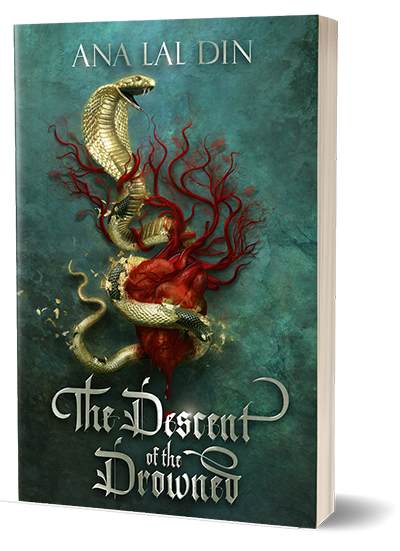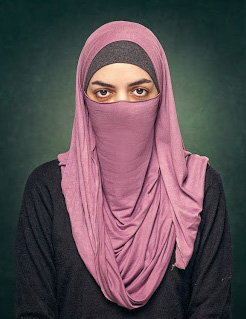 Greater Manchester, ENGLAND – She is bound to serve. He is meant to kill. Survival is their prison. Choice is their weapon. Ana Lal Din showcases her storytelling skills in her young adult debut, weaving together a harrowing narrative that examines humankind at its darkest and brightest. Set in a colonised Indo-Persian world and inspired by Pre-Islamic Arabian mythology, “The Descent of the Drowned” (March 15, 2021, White Tigress Press) weaves together tales of power, identity, redemption, and what it takes to hold on to one’s humanity in the face of devastation.
Greater Manchester, ENGLAND – She is bound to serve. He is meant to kill. Survival is their prison. Choice is their weapon. Ana Lal Din showcases her storytelling skills in her young adult debut, weaving together a harrowing narrative that examines humankind at its darkest and brightest. Set in a colonised Indo-Persian world and inspired by Pre-Islamic Arabian mythology, “The Descent of the Drowned” (March 15, 2021, White Tigress Press) weaves together tales of power, identity, redemption, and what it takes to hold on to one’s humanity in the face of devastation.
As the sacred slave of a goddess, Roma is of a lower caste that serves patrons to sustain the balance between gods and men. What she wants is her freedom, but deserters are hunted and hanged, and Roma only knows how to survive in her village where women are vessels without a voice. When her younger brother is condemned to the same wretched fate as hers, Roma must choose between silence and rebellion.
Leviathan is the bastard son of an immortal tyrant. Raised in a military city where everyone knows of his blood relation to the persecuted clans, Leviathan is considered casteless. Lowest of the low. Graduating as one of the deadliest soldiers, he executes in his father’s name, displaying his worth. When he faces judgement from his mother’s people — the clans — Leviathan must confront his demons and forge his own path, if he ever hopes to reclaim his soul.
But in the struggle to protect the people they love and rebuild their identities, Roma’s and Leviathan’s destinies interlock as the tyrant hunts an ancient treasure that will doom humankind should it come into his possession — a living treasure to which Roma and Leviathan are the ultimate key.
“The Descent of the Drowned”
Ana Lal Din | March 15, 2021 | White Tigress Press | YA/Crossover Indo-Persian Fantasy
Hardcover | 978-1-8380465-0-7 | $25.99
Paperback | 978-1-8380465-1-4 | $17.99
EBook | 978-1-8380465-2-1 | $9.99
 Ana Lal Din is an #ownvoices author who was born in a Danish southwestern city and raised in a small town outside Copenhagen. Passionate about culture, language, religion and social justice issues, Ana’s story worlds are usually full of all four.
Ana Lal Din is an #ownvoices author who was born in a Danish southwestern city and raised in a small town outside Copenhagen. Passionate about culture, language, religion and social justice issues, Ana’s story worlds are usually full of all four.
What drives her as a writer is developing characters that are psychologically and emotionally complex, reflecting human nature at its darkest and brightest — and everything in between. Since Ana is a Danish-Pakistani Muslim with Indian heritage, she often explores the intricacies of a multicultural identity through her characters. “The Descent of the Drowned” is her debut novel. For more info, visit laldinana.net.
In an interview, Ana Lal Din can discuss:
- Being a debut author during an unprecedented time in not just the publishing world but entire world
- Her experiences being an #ownvoices author from a multicultural background with a personality disorder
- Coming from a South Asian culture where women have less value than men and there is a caste system
- Her influences from Pre-Islamic Arabian society, religion, and mythology
- World-building in both fantasy and YA literature
An Interview with Ana Lal Din
1. How did you convey your own struggles with cultural identity through the two protagonists in the book?
Leviathan struggles with a physical sense of belonging in that the higher caste won’t accept him and neither will the clans. Roma struggles with a spiritual sense of belonging in that she feels disconnected from the belief system she has been raised with. Both characters have had society shape and force an identity on them that doesn’t harmonise with their nature, so they’re conflicted and rootless and have to dismantle their imposed identities, reconstruct them on their own terms, and carve out a place for themselves in the world — something that I feel I have had to do as well.
2. How did you handle the identity crisis that came from being raised in three different cultures (Danish, Pakistani-Indian, Islamic)?
I didn’t handle it. I grew up confused, frustrated, conflicted. I still am. I think most people, if not all, experience an identity crisis at some point in their lives. Mine also came from the fact that I was the youngest child of immigrant parents from an Indian-Pakistani and Muslim background. Choosing to be Muslim over Danish, Pakistani or Indian, eased some of that frustration, but nothing has been resolved. I’m still attempting to understand who I am. I’m still sorting through the cultural baggage to uncover the things that hold value to me and discard those that don’t. It’s a process. A long, unstable process.
3. How did you explore the theme of humanity versus depravity throughout the book?
Through the characters’ experiences, circumstances and choices. Some of the characters in the novel abandon human decency and become beasts. Others attempt to hold on to their humanity even in the darkest of times. I have tried to illustrate what happens when one crosses the line between humanity and depravity. When one chooses to oppress, violate, annihilate. And, also, when one chooses mercy, compassion and redemption.
4. How do humans become a product of their social and cultural heritage?
Social and cultural heritage is the behaviour, values, social status and belief system which we inherit from our environment (i.e. the people who raise us and the milieu wherein we are raised). We become a product of this heritage when we’re brought up in a particular environment with a particular belief system and uphold/follow that system with or without question.
5. What inspired you to start writing?
Stories. When I was a child, my older sisters would read the Arabian Nights and Danish fairy tales to me. I became so absorbed in the stories that I would enact them. If I didn’t like something, I changed the narrative or content. I discovered the power of words. That they can enlighten, manipulate, inspire, enrage. With this understanding, I wanted to use my own words to write something that might matter beyond just the entertainment value.
6. How did you portray the current issues, catastrophes, and sufferings of the voiceless within this fantasy world?
I have woven previous and current social, cultural and political issues into the setting. Things such as caste system, rape culture, ethnic cleansing/genocide, colonisation and war crimes are all familiar aspects of our world. I have explored those issues (and others) through the characters’ circumstances and personal experiences in the novel.
7. What is the connection between your background, the #ownvoices elements and the issues that are represented in the book?
Like most of the characters in the novel, I come from a multicultural background, and I have struggled to break out of the social and cultural heritage that shaped the world wherein I was raised. Moreover, I’m a woman with a mental illness, which made it harder for me in a culture where women are already considered a burden without much value, so a mental illness on top of that was like the final nail in the coffin. Caste is also a reality in my culture. The perception/oppression of women, multicultural identity, mental illness, social and cultural heritage, and caste system are subjects I have explored or engaged with throughout the novel.
8. What are some of the sources that have inspired the story world in your book?
I have attempted to build a colonised Indo-Persian world and drawn inspiration from pre-Islamic Arabian mythology, Islam, and the social, cultural, religious, and political history of South Asia, West Asia, the Middle East, ancient Arabia and other places over time. Most of the incidents in the novel are authentic cases from our own world in some shape or form.
9. What do you hope readers gain from your book?
I want to spread awareness. It reminds us that we as human beings have a responsibility toward each other. To know, to understand, to listen and to help. I want to provoke thought, and I want readers to feel. Whether that feeling is anger, discomfort, compassion, hope, curiosity or a conflicting combination of all. If I can encourage even one person to research about any of the issues, I would feel that I have achieved something valuable with this novel. That I have succeeded.

A former award-winning journalist with national exposure, Marissa now oversees the day-to-day operation of the Books Forward author branding and book marketing firm, along with our indie publishing support sister company Books Fluent.
Born and bred in Louisiana, currently living in New Orleans, she has lived and developed a strong base for our company and authors in Chicago and Nashville. Her journalism work has appeared in USA Today, National Geographic and other major publications. She is now interviewed by media on best practices for book marketing.
